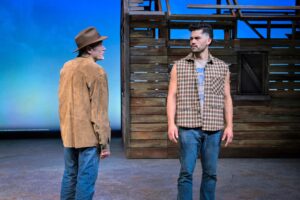Mother Road
Octavio Solis
Berkeley Repertory Theatre

Seventy-plus years have passed since the Joad family of John Steinbeck’s Grapes of Wrath joined a parade of desperate migrant farmers, all leaving their starving lives in Dust-Bowl-ravaged Oklahoma of the 1930s while looking for the lush life they saw painted on fruit crates from California. Two Joads – a mother and her little boy, William – did not join the clan in 1939, but instead remained behind to eke out a living and wait for an absent husband/father who never returned.
The once-boy William is now old and dying of a liver too long abused; but before he passes on, he wants to find a Joad to inherit his vast farmland to keep it from being sold to developers. His national search on Craigslist finds that Joad, a great-grandson of William’s first cousin, Tom; but this California-born Joad is now a Jodes named Martín. Moreover, Martín is Mexican American, leading the cracker-white, Okie William upon meeting Martīn to gasp and then spit out a disgust-filled, “Oh, sweet Jesus.”
With this opening premise, much-celebrated and much-produced playwright, Octavio Solis, begins his Mother Road, now in a totally captivating, deeply affecting, and highly entertaining staging at Berkeley Repertory Theatre.

When William reluctantly decides to give Martín a chance to prove he deserves to carry on the Joad name and land ownership in Oklahoma, the two set out to the homestead in Martín’s old pick-up, following in reverse order the road that brought the original Joads to Southern California, Route 66. As they travel this “mother road” that birthed so many stories of trouble-filled but hopeful migrations to the supposed Promised Land of California, the septuagenarian and the twenty-something each undergo a transformative journey full of difficult and sometimes painful acknowledgements and discoveries. But in the end, facing their pasts helps each to find a present where first-blush differences begin to blend to allow deep-rooted similarities to emerge. In doing so, the two help us all to see what a future America can and will look like – one where our many differences along every possible spectrum are the norm, the hope, and the salvation.

One of the Bay Area’s finest and most respected veteran actors, James Carpenter, is grippingly compelling as the gruff, growly, gravel-voiced William Joad, whose wizened, weathered face is a gnarled map of a life marked by hard work, too much drink, and now the ravages of liver cancer. He has a rattlesnake manner of quickly striking before he thinks about how insulting a racially or socially biased comment may actually be. At the same time, quick twinkles in his eyes and an occasional, slight smirk of a smile increasingly provide clues of creeping inclinations and growing satisfaction that maybe this Martín is a real Joad at heart. That is especially true when Martín says that it is “in the hands” how he knows how to farm and that “to own our own land” was a dream of his deceased mother – a dream he now wants to fulfill.

Equally impressive to James Carpenter’s bristly but heartwarming depiction of William is Emilio Garcia-Sanchez as a cocky, passionate Martín, who sports a quick tongue prone to hot-headed outbursts. His Martín has a history of a too-quick impulse to correct a perceived wrong with his strong arm, even if the target wears a badge. But around a long-time friend or at the mention of his mom, the softness of his heart and the depth of his loyalty overtake his being. Emilio Garcia-Sanchez is especially stunning as emotions well up within his Martín, with eyes that so believably express hurt, worry, and love as well as can equally burn with glaring indignation and anger.
His first reaction to William’s offer is not exactly the one the old man wants to hear: “You telling me I am going to own a honky farm in bum-fuck Oklahoma?” However, Martín begins to see something in this old, crotchety man that makes him eager to get the two of them into his trusted, open-back pick-up truck, Caesar, and to start the trip eastward to his new maybe-home, Sallisaw, Oklahoma.

An oft-appearing chorus of the various town and farm folk serve as verbal mile markers and journey narrators as the two travel the famed Route 66. The ensemble’s chanting and singing become descriptors of scenery and skies, motels and cafes, events and people as they also physically twist and turn the jalopy Caesar through the trip’s main and back roads.

Along the way, William and Martín try to pry from each other answers to questions they each have about who the other really is. Why did William and his mom not leave Oklahoma with the rest of the Joads, and what happened to his missing dad? Likewise, who was Martín’s dad; and what is that wrapped package he carries everywhere he goes? How did Martín get that Joad family Bible – one that is mysteriously missing a page and has verse numbers circled in strange places? The answers to these and many other secrets become part of the journey’s pivotal markers, the revelations of which are aided greatly by stories that start to be remembered and to spill out of both William and Martín. As they share, some memories play out in front of us, including several involving Martín’s once-bride-to-be and still love of his life, Amelia (Cher Alvarez), whom he five months prior left standing alone at the altar.

Many answers are discovered through the help of people the two meet along the way – especially those that begin to fill up the front and back of good ol’ Caesar. The first additional passenger is Mo, a migrant-working cousin of Martín, whom he swings by to find and to bring along as his future farm foreman … uh, forewoman. Lindsay Rico immediately is a spunky, sparky delight as the talkative, joking, warm-hearted Mo – a lesbian as unashamedly out and butch as she is forever fearless, friendly, and frisky. Somehow, her open spirit, no-b.s. approach, and even her firm commitment to turn his traditional farm into one fully organic quickly wins over William – long before he is yet sure how he truly feels about Martín. The three become an oddball trio of musketeers whose loyalty and love begins to grow in ways that will prove life affirming and life fulfilling for each.

Other people enter the scene to leave their mark and/or to join the troupe. Courtney Walsh is a ‘bless-your-heart’ roadside cafe waitress, Ivy, who is ecstatic to meet one of the Route-66-famous Joads but who loses some of that awe when she becomes highly indignant over William’s less-than-kind remarks about her former, Okie family. Daniel Duque-Estrada is a motel clerk, Abelardo, who is fighting to overcome anti-Okie prejudices his dead mother (a ghostly Cher Alvarez) still constantly pumps into his head. Brandon Davon Lindsay is James, another long-time friend of Martín, and an African American who brings a New Age respect for Mother Earth that he is prone to express with the rise-and-fall rhythm and passion of an evangelical preacher. James finds a seat in Caesar as a future Oklahoman as also does a gun-toting, quick-fingered farmhand named Curtis (Benny Wayne Sully), whose Choctaw heritage becomes an unlikely ticket to join the traveling band.
Together, this assortment of vagabonds becomes the America of today that William could never have imagined possible when he first meets his Mexican American, sole-surviving relative, Martín Jodes. Octavio Solis gives to the world a vision of an earth-honoring, people-respecting, and solidly united future that makes his Mother Road the timely and worthy successor to William Steinbeck’s Grapes of Wrath.
David Mendizábal masterfully directs a journey’s pace that speeds through its two-hours (plus intermission) with no bumps and with many memorable scenes full of surprise twists and turns. From sun-bleached, weather-worn buildings of wood to an old green truck whose hood and trunk hold pop-up surprises, Tanya Orellana’s scenic design quickly and seamlessly details the trip’s adventures. The changing scenes of a highway’s day and night are beautifully conveyed by the lighting artistry of Cha See while Jake Rodriguez once again reigns as a sound designer with realistic effects both from nature and human origins. Rodrigo Muñoz has designed costumes that are playful (e.g., Mo’s), foreboding (e.g., intruders with guns and chains), and memory-tugging (e.g., Ameila’s). The original music by Ritmos Tropicosmos provides the talented ensemble opportunities to become a radio’s musical companionship on the road or scene’s interlude.
In an election year where differences of race, religion, politics, and country-of-birth are dividing our nation, the difficult but life-changing journey undertaken in Mother Road is a most timely one for Berkeley Rep audiences to take along with the production’s jaw-droppingly stellar cast. This impressively directed, beautifully produced, and especially stellar-performed Mother Road by Octavio Solis is a must-see 2023-24 season bow for Berkeley Repertory Theater, bringing its positive, powerful vision of what a highly diverse America can be – a vision so ready to be more than just a pipe dream in a play’s script.
Rating: 5 E, MUST-SEE
Mother Road continues through July 21, 2024, in a two-hour (plus intermission) production by Berkeley Repertory Theatre in Peet’s Theatre, 2025 Addison Street, Berkeley, CA. Tickets are available online at www.berkeleyrep.org , by calling the Box Office Tuesday – Sunday, noon – 7 p.m. at 510-647-2949.
Photo Credits: Kevin Berne

Leave a Reply